Domyślnie WordPress wyświetla twoje wpisy na blogu na stronie głównej. Jeśli jednak tworzysz witrynę internetową dla firmy lub po prostu chcesz dostosować własną stronę główną, możesz chcieć osobnej strony dla sekcji twojego bloga.
Taka konfiguracja nie tylko pomaga utrzymać stronę główną w czystości i skupieniu, ale także zapewnia dedykowaną przestrzeń dla czytelników, aby mogli zapoznać się z treścią twojego bloga.
Aby poprawić komfort użytkowania i utrzymać wyraźny nacisk na naszą ofertę, dodaliśmy oddzielne strony blogów na wielu witrynach internetowych naszych firm partnerskich, w tym WPForms, OptinMonster i All in One SEO. Umożliwia to odwiedzającym łatwy dostęp do treści bloga, przy jednoczesnym priorytetowym traktowaniu głównego celu, jakim jest promowanie naszych wtyczek.
W tym artykule pokażemy dwa sposoby na utworzenie osobnej strony dla wpisów na blogu w WordPress.
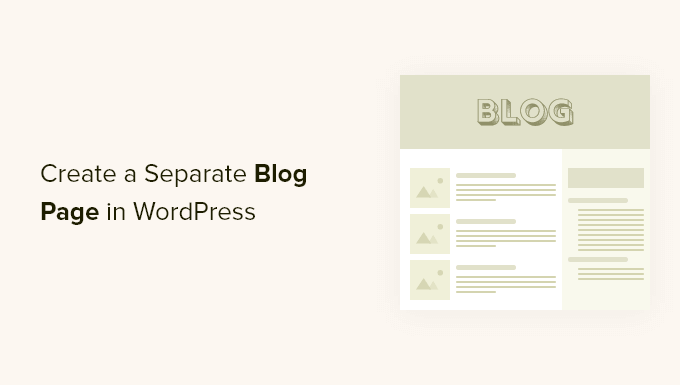
Dlaczego warto wyświetlać wpisy na blogu na osobnej stronie?
Strona główna to strona główna Twojej witryny internetowej WordPress i pierwsza strona, którą widzą odwiedzający. Domyślnie WordPress wyświetla twoje najnowsze wpisy na stronie głównej i ma to sens, jeśli prowadzisz bloga.
Ale nie zawsze jest to idealne rozwiązanie dla witryn internetowych małych firm. Prawdopodobnie będziesz potrzebował bardziej angażującej strony głównej, która opowie użytkownikom o twojej firmie, produktach i usługach, pozwoli im dowiedzieć się, jak się z tobą skontaktować i zwiększy konwersję sprzedaży.
Teraz, jeśli chcesz również prowadzić bloga na swojej witrynie internetowej, będziesz musiał udostępnić inną stronę, na której odwiedzający będą mogli przeczytać twoje wpisy.
Mając to na uwadze, pokażemy ci, jak łatwo utworzyć oddzielną stronę dla wpisów na blogu w WordPress.
W tym poradniku omówiliśmy dwie metody i możesz skorzystać z poniższych odnośników, aby przejść do wybranej przez siebie metody. Należy pamiętać, że druga metoda jest najprostsza i oferuje najwięcej konfiguratorów:
Film instruktażowy
Jeśli wolisz pisemne instrukcje, czytaj dalej.
Metoda 1: Tworzenie oddzielnych stron dla wpisów na blogu w WordPressie
Możesz utworzyć oddzielną stronę dla wpisów na blogu przy użyciu domyślnych ustawień WordPress.
Metoda ta wymaga jednak nieco więcej pracy niż metoda 2 i nie oferuje tak wielu opcji dostosowywania.
Tworzenie oddzielnej strony głównej i strony bloga
Po pierwsze, musisz utworzyć dwie oddzielne strony WordPress, które będą używane jako twoja strona główna i strona bloga.
Nie musisz dodawać żadnych treści do tych stron i możesz nadać im dowolną nazwę. Dla przykładu, niektóre witryny internetowe dla firm używają nazwy “Aktualności” dla strony bloga.
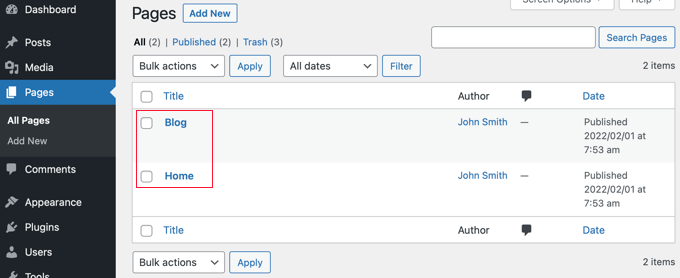
Po utworzeniu tych stron, przejdź na stronę Ustawienia ” Czytanie w obszarze administracyjnym WordPress.
Teraz, w sekcji zatytułowanej “Wyświetlanie twojej strony głównej”, musisz kliknąć przycisk “Strona statyczna”.
Następnie możesz wybrać strony Home i Blog, które utworzyłeś wcześniej. Następnie przewiń w dół i kliknij przycisk “Zapisz zmiany”.

Teraz, gdy przejdziesz do ekranu Strony ” Wszystkie strony z kokpitu WordPress, zobaczysz, że strona główna jest oznaczona jako “Strona główna”, a strona bloga jest oznaczona jako “Strona wpisów”.
Kliknij odnośnik “Zobacz” na stronie bloga, aby wyświetlić podgląd.
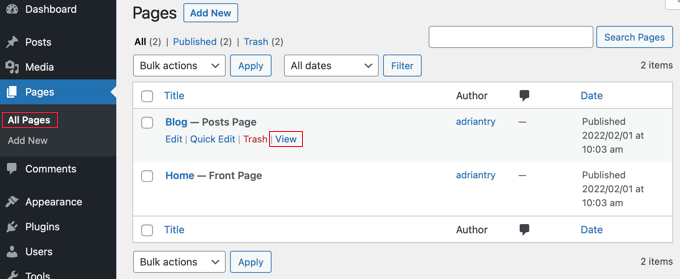
Wygląd tych stron zależy od twojego motywu WordPress i możesz chcieć skonfigurować te ustawienia.
Na przykład, jeśli twój motyw ma menu nawigacyjne, to powiadomienie, że WordPress automatycznie utworzył strony Blog i Strona główna. Jeśli nie, to zapoznaj się z naszym przewodnikiem dla początkujących, jak dodać menu nawigacyjne w WordPress.
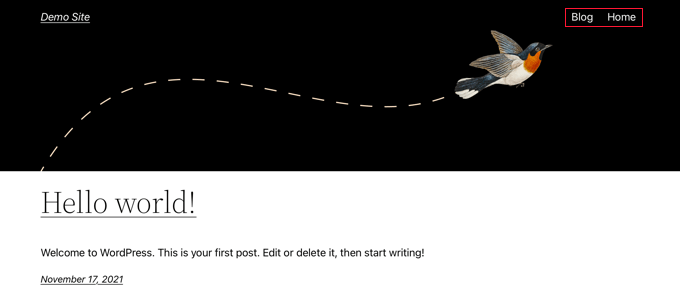
Dostosuj swoją stronę główną do własnych potrzeb
Jak dotąd, twoja nowa strona główna jest pusta. Teraz nadszedł czas, aby dodać informacje o Twojej firmie, produktach i usługach oraz poinformować odwiedzających, w jaki sposób mogą się z Tobą skontaktować.
Możesz dowiedzieć się, jak to zrobić w naszym przewodniku na temat tworzenia własnej strony głównej w WordPress. W Metodzie 1 pokazujemy, jak używać edytora bloków do dodawania obrazków okładek, kolumn, tabel, tekstu i multimediów, galerii i innych elementów.
Wiele kreatywnych pomysłów na konfigurator znajdziesz również w naszym przewodniku na temat tego, jak łatwo i skutecznie edytować stronę główną WordPress.
Dostosuj stronę swojego bloga do własnych potrzeb
Jeśli jesteś zadowolony z tego, jak wygląda twoja strona bloga, to twoja praca jest skończona.
Jeśli jednak obecnie korzystasz z motywu opartego na blokach, to możesz również dostosować konfigurator na swojej stronie bloga, przechodząc na ekran Wygląd ” Edytor z kokpitu WordPress.
Gdy już się tam znajdziesz, wybierz opcję “Strony” z lewej kolumny w pełnym edytorze witryny.
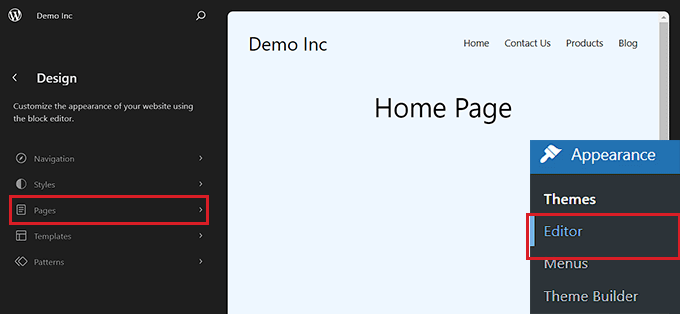
Spowoduje to otwarcie listy wszystkich stron twojej witryny internetowej w lewej kolumnie.
Z tego miejsca wybierz opcję strony “Blog”, a następnie kliknij podgląd strony po prawej stronie, aby rozpocząć konfigurowanie twojej strony bloga.
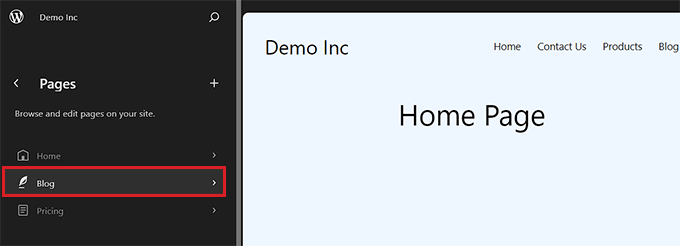
Możesz teraz kliknąć przycisk dodawania bloku “+” w lewym górnym rogu ekranu i dodać wybrane przez ciebie bloki do strony.
Dodatkowo możesz zmienić kolor tła, tekstu lub odnośników na twojej stronie bloga, klikając ikonkę “Style” w prawym górnym rogu ekranu.
Spowoduje to otwarcie panelu bloków po prawej stronie, z którego można kliknąć kartę “Typografia”, aby zmienić kolor tekstu, kartę “Kolory”, aby zmienić kolor tła, oraz kartę “Układ”, aby skonfigurować wymiary twojej strony bloga.
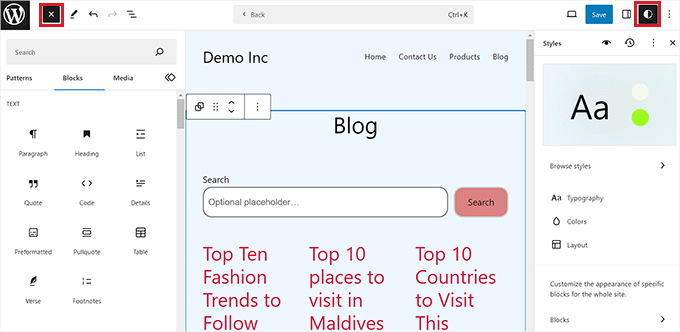
Po zakończeniu nie zapomnij kliknąć przycisku “Zapisz” u góry, aby zapisać twoje ustawienia.
Teraz możesz przejść na stronę twojego bloga WordPress, aby zobaczyć, jak wygląda.
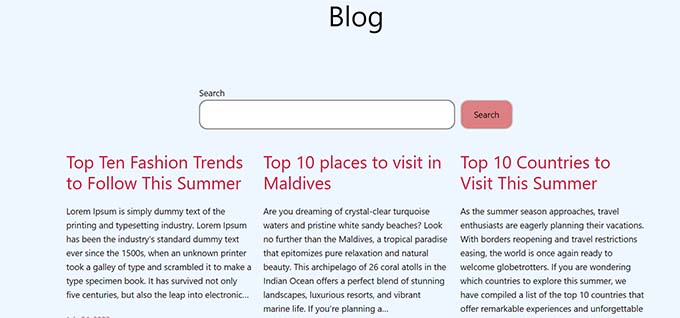
Jeśli jednak korzystasz z klasycznego motywu, będziesz musiał użyć metody 2, aby dostosować stronę wpisu na blogu.
Metoda 2: Tworzenie dostosowanej strony dla wpisów na blogu za pomocą narzędzia Drag & Drop Builder (zalecane)
Wtyczka do tworzenia motywów umożliwia łatwe tworzenie własnego motywu WordPress bez żadnego kodu. Obejmuje to możliwość tworzenia i dostosowywania oddzielnej strony dla wpisów na blogu.
Instalacja kreatora motywów SeedProd
Najpierw należy zainstalować i włączyć wtyczkę SeedProd. Aby uzyskać więcej informacji, zobacz nasz przewodnik krok po kroku, jak zainstalować wtyczkę WordPress.
SeedProd to najlepszy kreator stron WordPress typu “przeciągnij i upuść ” dla firm, blogerów i właścicieli witryn internetowych. Posiada również kreator motywów, który pozwala łatwo dostosować twoją stronę bloga i wiele więcej.
Więcej szczegółów można znaleźć w naszej pełnej recenzji SeedProd.
Po włączaniu przejdź na stronę SeedProd ” Ustawienia, aby wpisz klucz licencyjny. Informacje te można znaleźć na Twoim koncie w witrynie internetowej SeedProd.
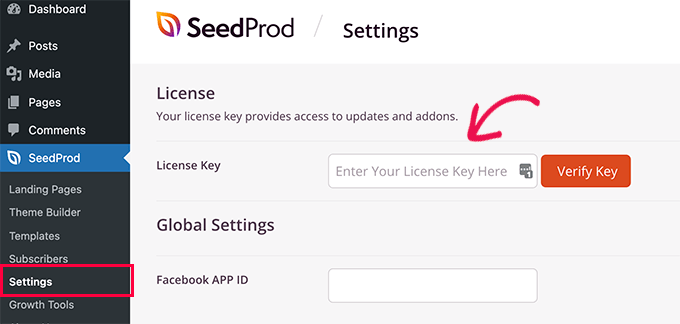
Następnie nadszedł czas na stworzenie własnego motywu WordPress. Jest to znacznie prostsze niż się wydaje.
Tworzenie własnego motywu WordPress
Najpierw należy przejść na stronę SeedProd ” Kreator motywów. Tutaj użyjesz jednego z gotowych motywów SeedProd jako punktu wyjścia. Pozwoli to zastąpić twój istniejący motyw WordPress nowym, dostosowanym projektem.
Można to zrobić, klikając przycisk “Motywy”.
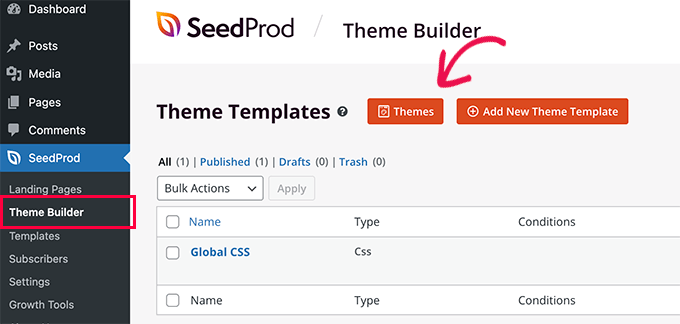
Zostanie wyświetlona lista profesjonalnie zaprojektowanych motywów przeznaczonych dla różnego rodzaju witryn internetowych.
Na przykład istnieją szablony o nazwach “Nowoczesny biznes”, “Agencja marketingowa” i “Motyw pośrednika hipotecznego”.
Zapoznaj się z opcjami i wybierz tę, która najlepiej odpowiada twoim potrzebom, klikając ikonkę znacznika wyboru.
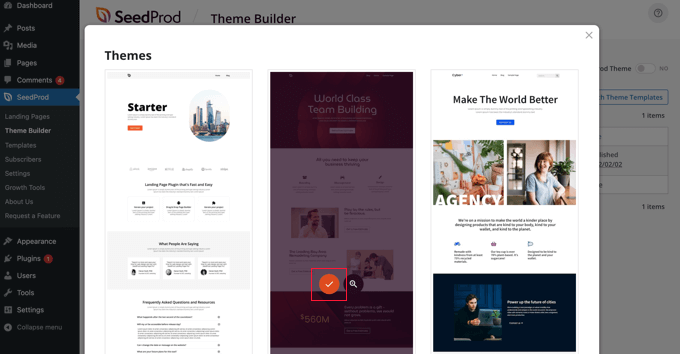
Po wybraniu motywu, SeedProd wygeneruje wszystkie szablony motywów, w tym jeden dla indeksu twojego bloga i jeden dla twojej strony głównej.
Nie są to tylko puste strony, ale zawierają atrakcyjne układy i treści zastępcze, które można łatwo dostosować do własnych potrzeb.
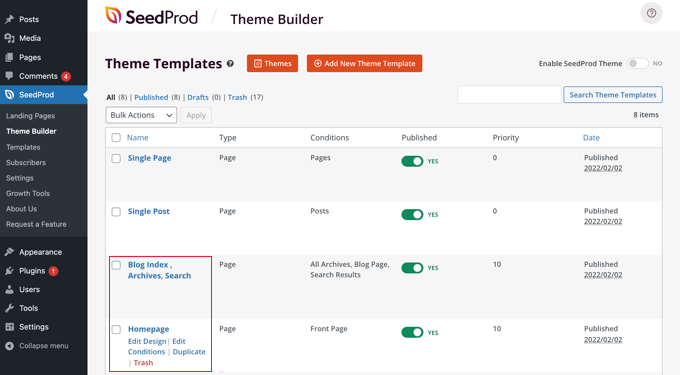
W tym poradniku pokażemy, jak dostosować szablony strony głównej i indeksu bloga.
Możesz także dostosować inne szablony do własnych potrzeb. Aby dowiedzieć się, jak to zrobić, zapoznaj się z naszym przewodnikiem dla początkujących, jak łatwo stworzyć własny motyw WordPress.
Dostosuj swoją stronę główną do własnych potrzeb
Po wygenerowaniu twoich szablonów motywów możesz je edytować za pomocą kreatora motywów SeedProd. Zaczniemy od szablonu strony głównej.
Aby rozpocząć, wystarczy kliknąć odnośnik “Edytuj projekt” na stronie głównej.

Spowoduje to uruchomienie pliku szablonu w kreatorze motywów SeedProd.
Ten prosty kreator typu “przeciągnij i upuść” wyświetla podgląd na żywo twojej strony po prawej stronie i pasek narzędzi blokowych po lewej.
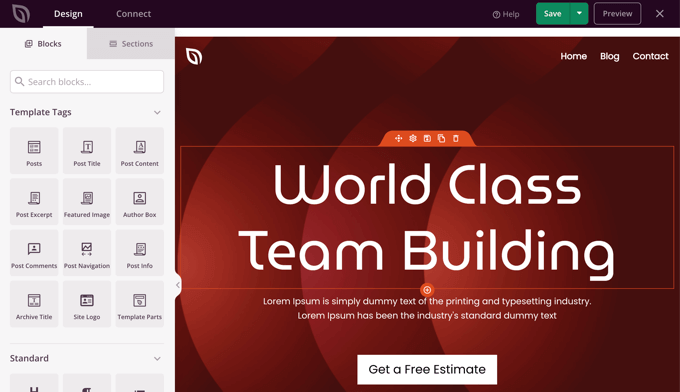
Możesz dostosować dowolny blok, klikając go, przeciągając bloki w górę i w dół za pomocą twojej myszy i dodając nowe bloki do strony.
Napisaliśmy kompletny przewodnik na temat tworzenia własnej strony głównej w WordPress. Po prostu przewiń w dół do metody 2, aby dowiedzieć się, jak dostosować twoją stronę główną za pomocą SeedProd.
Dostosuj stronę swojego bloga do własnych potrzeb
Kreator motywów SeedProd zapewnia również wiele sposobów na dostosowanie strony indeksu twojego bloga.
Zacznij od kliknięcia odnośnika “Edytuj projekt” pod stroną.

Zobaczysz ten sam panel podglądu po prawej stronie i pasek narzędzi po lewej. Stronę bloga można dostosować w taki sam sposób, jak stronę główną.
Na przykład po kliknięciu nagłówka można zobaczyć wszystkie jego ustawienia. Możesz edytować tekst, zmienić wyrównanie i wielkość pisma i wiele więcej.
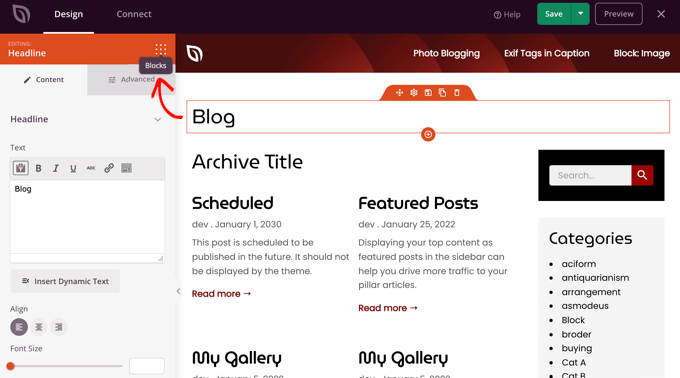
Po zakończeniu należy kliknąć ikonkę “Bloki”, aby powrócić do paska narzędzi.
Kreator motywów SeedProd oferuje dodatkowe bloki fragmentów szablonu, takie jak blok Wpisy, który wyświetla listę zablokowanych wpisów na twoim blogu.
Blok Wpisy został już dodany do szablonu indeksu bloga dla Ciebie, a w tym szablonie blok wyświetla twoje wpisy w dwóch kolumnach. Możemy to zmienić na pojedynczą kolumnę.
Wystarczy kliknąć na wpis, a następnie zmienić ustawienie “Kolumny” na 1.
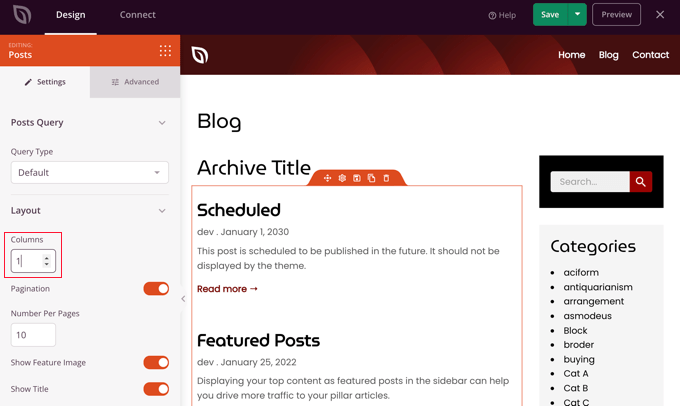
Układ natychmiast zmieni się na jednokolumnowy.
Przewijając w dół ustawienia bloku Wpisy, znajdziesz przełączniki, które pozwalają wybrać, czy wyświetlać obrazek wyróżniający i tytuł wpisu. Możesz także wybrać tagi nagłówka, które będą używane w tytule wpisu.
Dostępne są również opcje wyświetlania różnych metadanych wpisów. Możesz przełączać datę modyfikacji, autora, datę i godzinę publikacji oraz liczbę komentarzy.
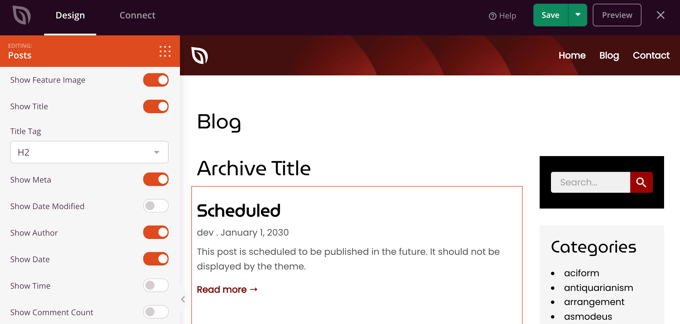
Oto kilka innych sposobów na dostosowanie indeksu twojego bloga:
- Indeks można filtrować według typu treści, kategorii, tagu lub autora.
- Kolejność sortowania wpisów można zmienić.
- Możesz wybrać liczbę wpisów wyświetlanych na stronie.
- Można przełączać zajawkę wpisu i dostosować jej długość.
Po zakończeniu konfiguratora własnej strony bloga, upewnij się, że kliknąłeś przycisk “Zapisz” u góry ekranu. Następnie możesz powrócić do listy szablonów, klikając ikonkę “X”.
Włączanie motywu SeedProd
Po zakończeniu konfigurowania szablonów motywów należy opublikować nowy motyw własny.
Wystarczy przełączyć ustawienie “Włącz motyw SeedProd” na pozycję “TAK”.
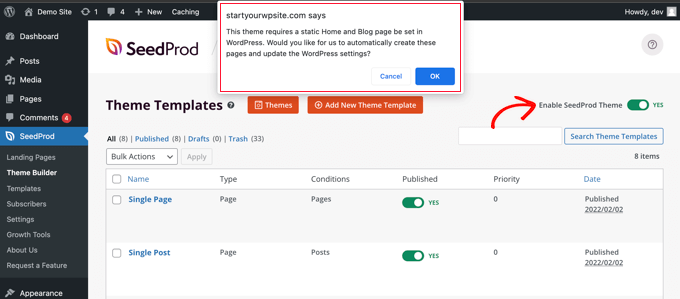
Natychmiast pojawi się powiadomienie o konieczności zmiany ustawień strony głównej i bloga WordPress. Po kliknięciu przycisku “OK” ustawienia te zostaną zmienione.
Możesz teraz przejść na swoją witrynę internetową, aby zobaczyć nową stronę główną i stronę bloga. Tak wygląda strona indeksu bloga na naszej witrynie demonstracyjnej.
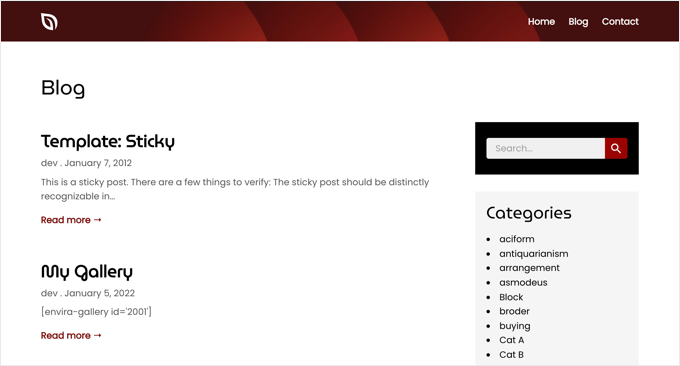
Bonus: Wyświetl twoje ostatnie wpisy w WordPressie
Po utworzeniu osobnej strony z blogiem, możesz nadal wyświetlać kilka ostatnich wpisów na stronie głównej, aby zachęcić użytkowników do odkrywania większej części twojej witryny.
Aby to zrobić, otwórz swoją stronę główną w edytorze bloków WordPress. Gdy już się tam znajdziesz, kliknij przycisk “Dodaj blok” w lewym górnym rogu ekranu, aby otworzyć menu bloków.
Stąd wystarczy dodać blok “Najnowsze wpisy” do strony. Gdy to zrobisz, możesz dostosować listę ostatnich wpisów, aby wyświetlać zajawki, nazwiska autorów i daty zgodnie z twoimi upodobaniami.
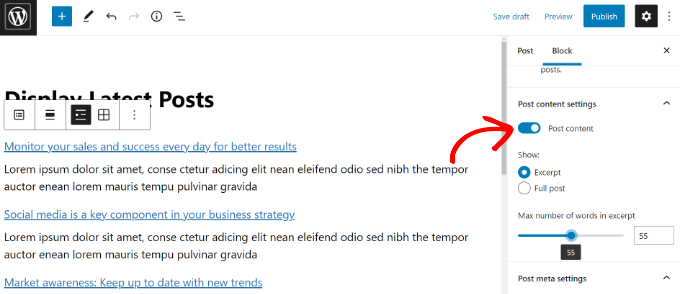
Na koniec kliknij przycisk “Opublikuj” u góry, aby zapisać twoje ustawienia. Teraz niektóre z twoich ostatnich wpisów będą nadal wyświetlane na stronie głównej, aby użytkownicy spędzali więcej czasu na twojej witrynie internetowej.
Więcej informacji można znaleźć w naszym poradniku na temat wyświetlania ostatnich wpisów w WordPress.
Mamy nadzieję, że ten poradnik pomógł ci dowiedzieć się, jak utworzyć osobną stronę dla wpisów na blogu w WordPress. Możesz również dowiedzieć się , jak dodać własny status wpisu dla wpisów na blogu w WordPress lub sprawdzić naszą listę najlepszych wtyczek powiązanych wpisów dla WordPress.
If you liked this article, then please subscribe to our YouTube Channel for WordPress video tutorials. You can also find us on Twitter and Facebook.





Krystian
I can’t figure that one out
I wanted to add some guest posts to my blog, but I want them to be in the separate category (available thru the menu).
For that I created new category, put it up in the menu and I selected the guest post to be visible only in that category (tick box), but when I publish it, it appears in both: my guestpost category (available from the menu) and on my main .com site, where I have all my other posts listed.
How can I turn it off from the main site?
Krystian
Sarah
Hi, just started my blog and am wondering How many posts WordPress keeps on the same page before having a “see older posts” button at bottom to take you to the next page? My homepage is getting longer and longer by the minute lol. Thanks!
Rhys
Hi Sarah,
You can change the amount of posts you show per page in WordPress Admin > Settings > Readying. The default is 10 from what I understand, although you can change this to whatever you feel like. The more posts per page, the slower load times you may incur.
All the best,
Ruth
Very clearly explained and wonderfully helpful. I had my blog page up and populated within minutes of watching your video. Thank you!
Ronnie
I load the sample page created by wordpress on localhost, it show properly BuT WHEN I access it thru another computer on a different internet, it show not properly.
nishant saraswat
i create my website at wordpress and now i want to create my site user friendly and beautiful i know html and some of javascript,css and php but not completly.i want to create my site beautiful either from some codings or from without codings.so,please help me to create my website.that how i create functions for users to look my site comfort to them please tell me whole process.i create a website by hostgator and sent you my reciept details.please help me i have followed you.
WPBeginner Support
First you need to choose a theme. After that if you want to further customize then you can create a child theme. There are several tools that you can use like CSS Hero and a page builder to quickly create beautiful pages with out writing much code.
Admin
Maya
What if those options are not available under template when creating a new page?
WPBeginner Support
The template names may vary from one theme to another.
Admin
Sally E
Hello,
I’m using the customizr theme and I like how it looks with blog posts showing up on the home page for now.
I would also like to have a “blog” page that links to blog posts as well since later I’ll be writing items that won’t go under the blog tab.
Is there a way to have the blog posts show up on the home page as well as on a separate page?
Thanks in advance!
Rosalinde
I have the same problem, I would love to know how to use the default homepage of the theme and a blog page that links to blog posts.
chibueze
Please, why is it that when I post in my blog, it displays all the contents of my post on that page, including images and Writings
WPBeginner Support
By default WordPress shows full post on all pages. This can be changed by using excerpts. Please see our guide How to customize WordPress excerpts no coding required.
Admin
Michelle
Like many others, I’ve been trying everything to figure this out…thank you for making it so easy!!!
Kristy
After a long, frustrating day of trying to figure this out, I will sleep a little better tonight. It now seems so obvious but for some reason, I just couldn’t figure it out today. I googled and read several forum posts where everyone said this was impossible & you just had to create category to handle a blog. I really didn’t like the way this looked on my site but decided I would just have to deal with it until I figured something else out. Thanks so much for this video. You have made my day! Now I’m going to check out your other articles hoping they will be helpful with my hundreds of other questions.
Tuncay
Hi,
I have a news website, I want to create a Forum Page, but the forum page should be take the news from other pages and my visitors can disscuss under the news in forum page,
how cna it be possilbe?
could you please help me on this?
Thanks
WPBeginner Support
See our guide on how to add bbPress forum for WordPress posts comments. This approach allows you to add a forum thread for each article you publish.
Admin
Harshit
Hi ,
This is a very helpful video. It really helpful to me. thank you for the tutorial. And you have a very nice voice.
thank you,
Zach
Helpful, thanks.
But it looks like my theme only has one template (“Default Template).
When I go to Pages, and try to Quick Edit my page, I only see “Default Template” in the dropdown of “Templates.”
Am I able to add/import more templates into my current theme? I couldn’t find a WPBeginner tutorial on this…
Thanks,
Zach
WPBeginner Support
Seems like your theme does not have a separate template for blog posts. You can try using the default template and see if it does what you need. Alternately, you can create a custom template of your own. See our tutorial How to create a custom page in WordPress. Please note that it requires some basic knowledge of html and php.
Admin
Zeeshan Ali Kaimkhani
good project
Gary
Grerat video, Thanks But when I changed the posts to the blog page, my custom theme home page is also showing the blogs. How do I keep the current custom theme home page and just move the blogs to the new blog page?
Thank you in advance.
Gary
WPBeginner Support
Please contact your theme support.
Admin
Mohsin
Hi thanks for your tutorial.
but i have problem
i am creating custom theme and i have multiple option on page for example page layout and enable top slider on this page but when i select posts page : blog
custom options are not working.
Elizabeth
Wonderful! Been searching for a very simple and straight forward tutorial, glad I found this site!
Lara
Your tutorial was awesome, thank you so much! So simple and straightforward, you helped me get my blog up and running in a few minutes. You rock!
Debbie
My problem is that on the blog page, where just the excerpts are, it reads about the first 55 words of my blog posts, but then there is no “More” or anything for them to click to read the entire post. How do I create that? They can click the image of the post, and it takes them to the full post, but there is no information that says to do that. I’m stumped!
Stephanie
OMG this was SO helpful. As a novice blogger I was finding it so impossible to create a blog post page and include that page on my menu. I can’t tell you how many times I attempted to do this in the most complicated ways. Thank you for the EASY and FAST tutorial! I am so happy!
Diane Lee
Thank you for this tutorial. I’m new to WordPress, and this was very helpful!
Ted Sherwood
Syed and team. First, thanks for a very helpful site. It’s now the first place I go to for WordPress help.
I have a theme that allows my latest posts or a static page for the front page. I already have many blog posts. And I have an existing page that I could use, with a couple of additions probably, as my front page. So I interpreted the above article as implying that I don’t need to create any new pages. However, when I try and follow your Settings/Reading instructions, there is no option under Posts for the blog page, just all the other existing pages. Perhaps there’s something I’ve missed?
WPBeginner Support
The article does mention that you need to create a new page for your blog posts.
Admin
Jason G
Very helpful especially if you have not been using a blog and are only accustomed to static pages on your sites. Thanks!
Arfa
Hey syed
Though the article is really helpful and I am succeeded in adding pages to my blog but can you please tell me how to add a post in that particular page like i have added page titled as food for thought and i have to add a post in that, how can i do that ?
Please advice.
Patti
I’m having the same issue….
Harold Buchman
Excellent tutorial –
One thing to look out for:
My custom blog page did not work while I was signed in as the administrator on my WP control panel in another browser window. As soon as I signed out, the link worked exactly as describe.
Charli
I don’t have the reading settings option… do you know what i should do ?
Abel
Good enough i hadn’t yet published my website to the world This is so helpful.. I would have forget-en how to do this and ended up ridiculously frustrated.
Heather
Thanks for the help—but I have another question kind of related..
Every post i create in my wordpress is appearing in my BLOG section..even though I do not have the ‘blog’ category (or any for that matter checked before publishing.
Here’s my site – –can you help
elizabeth
What if I want to create 2 pages but those 2 pages should have my blog posts. for eg: one page should blogs about clothing and another page should have blogs about “jewellery”
Judi Sutherland
My understanding is that you can’t have two pages of blog – only one on any site. Unless anyone knows different.
Steve
You can have as many blog pages as you like if you create custom page templates with the WordPress loop in each. This is more a nudge in the right direction than a complete answer. Hope it helps some
Riaz
Been searching hours for this, thank you Syed!
Christina Elizabeth
Thank you for this tutorial. It has been very useful. I now have a menu of separate categories for my blog. I will be back I am sure!
rovingjay
Worked like a charm … thanks for the really helpful video. I’ve been wanted to switch to a static home page but didn’t know how to also have a blog post page – one simple search and I found wpbeginner! Really appreciate it. thanks, Jay
aprav kumar
Thanks but After i did this Widgets missing from Blog Page
I am using Minamaze theme
and using plugin “eCommerce Product Catalog” by impleCode for product catalog ,since i dont want sidebar widgets to appear in all pages I used plugin “Widget logic” to make widgets appear just 2 pages which are “Blog” post page and “Products” Page .
And then all the posts are appearing in “Home” Page which is front page , so i changed “Static Front Page” Option from “Latest posts” to “Static Page” and FrontPage to Home and Posts Page to Blog , The moment i saved …. Widgets in “Blog” Page dissappeard but in “products” page it is showing up …..
Please Help me with this…. I am newbie in WordPress( just 2 days)
Jenny
this is happening to me, too, did you get an answer?
WPBeginner Staff
Many WordPress themes use a full width page template for pages with no sidebars. You can see if there are multiple templates available by editing the page in WordPress. When you will edit the page on your right hand you will see a meta box labeled templates with a dropdown menu. Try switching templates to see if you have one with the sidebar.
Jonella
I have a Blog page already. The blog posts appeared when I made a page edit and then they didn’t. I tried to revert back to the previously saved version but the posts aren’t there anymore. I can find the posts in the Posts section, they’re just not “connecting” to the Blog page anymore if that makes sense. I’m slightly panicking. Can someone help me out?
Ojabierto
Thanks a lot, you saved my night!
WPBeginner Staff
Jill this means your blog page is not working correctly, please follow the instructions carefully again.
Jill
This worked great for me but my blog page doesn’t have my blogs on – they are showing on the home page in a list in sidebar with “Archive”
Aniee
Nice , Could you explain a bit will the Seo work? in same way ? please elaborate. wile creating a seperate blog page , will seo of the website as a whole be effected, i mean with ‘/blog’ is better or just http://www.website.com , or both are same ? (in regards to seo)
Henrique
This was really useful and fast to read/implement, thanks!
WPBeginner Staff
Twenty Thirteen supports templates.
sumeet kumar
i can not understand the blog and cms in websites. please help…..
David
Looks like Twenty Thirteen, the theme I am using, doesn’t support this template feature which Twenty Twelve has. Right? What’s the solution in this case then? Any ideas?
Francois
How do I get the posts on my homepage I made a blog to display the posts as a list?
WPBeginner Staff
Did you try disabling comments on the home page by editing it?
Your blog page is just a placeholder. You are not supposed to edit it. The display of your blog entries on that page is handled by your theme.
Go to pages and edit the blog page. Under Page Attributes meta box, select default template and save your changes.
Hope this helps.
Claudius_II
Am attempting to create a blog on a blog page and have a fixed front page for my website. Have followed all your instructions as above and still comments [or blogs?] appear on the front page.
The blogs page has no fields for inserting comments or blog entries. I’ve disabled comments for this page so only blog comments should appear here.
Under Reading Settings have done exactly what you illustrate, a static front page and blogs to a blogs page. Have a menu item on my front page aslo which goes to blogs page. Blogs page exists but is unwritable.
What am I doing wrong?
Using the commercial “X” theme.
site is here:
Note some page links not working for all pages.
Thanks very much for any help.
firdaus
thanks. it works just nice
Anne
I’ve spent hundreds of dollars on books and courses to try to learn WordPress. Your tutorials are the first thing that finally enabled me to do what I need to do with my website. Thank you!
SmartglassesHQ
This is so helpful.. I always forget how to do this and end up ridiculously frustrated. I’ll try to remember for next time.
Yousuf Atik
Is there a way to post blog entries in different pages of the site? I would like to divide my blog into 3 section and post different blog entries in the different pages
WPBeginner Staff
Yes, there are several ways to do this. You can create categories for each section and use the categories in your site’s navigation menu. Then you can use a static page as your site’s front page.